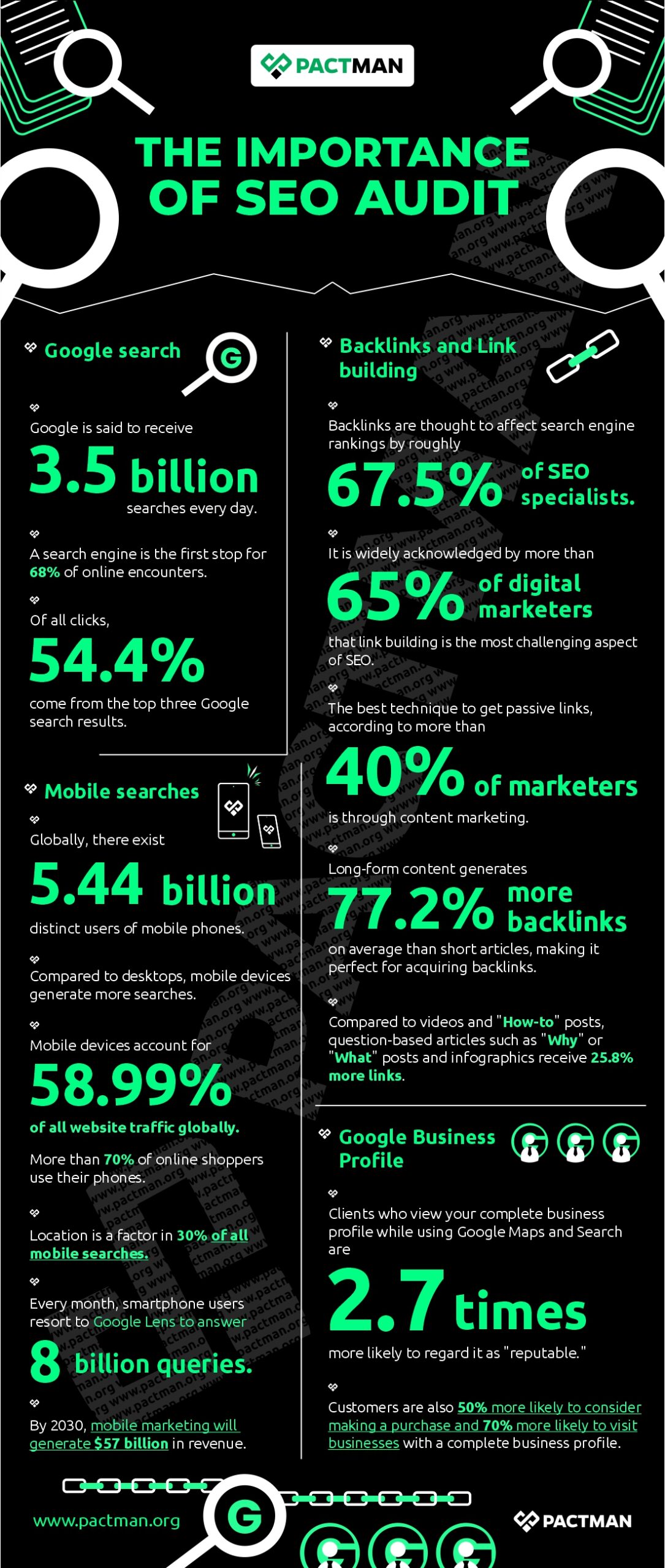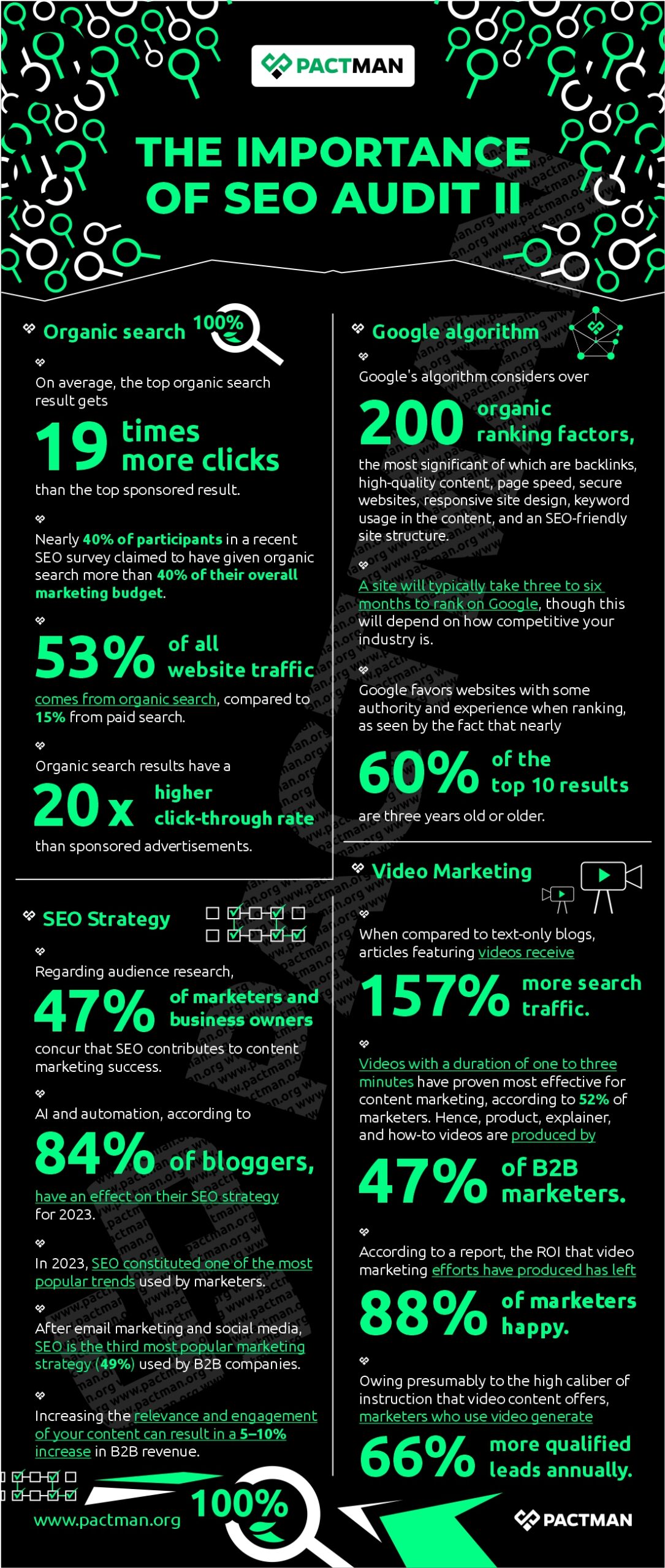I
Introduction
Without a doubt, investing in an SEO audit is a worthwhile endeavor. Although it might cost you initially as a nonprofit, the investment however is far advantageous in the end.

As we all know, a search engine results page (SERP) is facilitated by an SEO audit which is a health check that you can perform on your website. Essentially, conducting SEO audits can provide insights into the issues that might be impacting your website’s search engine ranking.
For the most part, URL redirections, fresh content, and newly added, altered, or deleted pages can cause websites to change frequently. Hence, conducting routine audits guarantees that the user experience is not adversely impacted by these updates and modifications. Audits also assist in determining areas on your website that may be enhanced to raise search engine rankings.
II
What is an SEO Audit?
An SEO audit is a thorough evaluation of a website’s present optimization state. It is a procedure for assessing if a website is search engine friendly while also pinpointing areas that require work. In simple terms, an SEO audit provides an essential first step to maximizing a website for search engines and online visibility. This helps to address indexing, user experience, and backlink profiles.

Also, an SEO audit entails technical investigation and assessment of the on-page and off-page optimization of a website. By and large, this ensures improved search engine rankings, increased organic traffic, and increased donor leads and donations for nonprofits.
Nonprofits can utilize this process to find optimization gaps on their websites and implement the necessary fixes to strengthen their online visibility. Also, by offering information on the strategies and tactics used by renowned NGOs, SEO audits can assist nonprofits in staying one step ahead of industry trends.
III
Critical Statistics to Consider on SEO Audit
In this section, we will highlight the importance of an SEO audit based on important statistics.
a. Search results
Google is said to receive 3.5 billion searches every day. Also, a search engine is the first stop for 68% of online encounters. Of all clicks, 54.4% come from the top three Google search results.

b. Mobile searches
Globally, there exist 5.44 billion distinct users of mobile phones. Compared to desktops, mobile devices generate more searches. Also, mobile devices account for 58.99% of all website traffic globally. More than 70% of online shoppers use their phones. In addition, location is a factor in 30% of all mobile searches.
Every month, smartphone users resort to Google Lens to answer 8 billion queries. By 2030, mobile marketing will generate $57 billion in revenue.
c. Backlinks and Link building
Backlinks are thought to affect search engine rankings by roughly 67.5% of SEO specialists. Without links, it is practically hard to rank your website for high search volume keywords on Google. Hence, it is best to allocate half of your SEO budget to link building, as higher-ranking websites typically have more backlinks.
It is widely acknowledged by more than 65% of digital marketers that link building is the most challenging aspect of SEO. However, the best technique to get passive links, according to more than 40% of marketers, is through content marketing.
Long-form content generates 77.2% more backlinks on average than short articles, making it perfect for acquiring backlinks. The bulk of Google searches consist of long-tail keywords. Also, compared to videos and “How-to” posts, question-based articles such as “Why” or “What” posts and infographics receive 25.8% more links.

d. Organic search
For brands, the biggest and most efficient sources of return on investment in marketing are organic search and referral traffic. On average, the top organic search result gets 19 times more clicks than the top sponsored result.
Also, the best indicator of content performance, according to a panel of marketing professionals, was organic traffic. Nearly 40% of participants in a recent SEO survey claimed to have given organic search more than 40% of their overall marketing budget.
53% of all website traffic comes from organic search, compared to 15% from paid search. In addition, organic search results have a 20X higher click-through rate than sponsored advertisements. An additional justification for beginning your SEO investment!
e. SEO strategy
Regarding audience research, 47% of marketers and business owners concur that SEO contributes to content marketing success. AI and automation, according to 84% of bloggers, have an effect on their SEO strategy.
Also, in 2023, SEO constituted one of the most popular trends used by marketers. After email marketing and social media, SEO is the third most popular marketing strategy (49%) used by B2B companies.
f. Content Performance
The primary indicator of content performance used by B2B marketers is website traffic. Hence, increasing the relevance and engagement of your content can result in a 5–10% increase in B2B revenue.
g. Google Business Profile
Clients who view your complete business profile while using Google Maps and Search are 2.7 times more likely to regard it as “reputable.” Customers are also 50% more likely to consider making a purchase and 70% more likely to visit businesses with a complete business profile.
h. Google algorithm
Google’s algorithm takes into account over 200 organic ranking factors, the most significant of which are backlinks, high-quality content, page speed, secure websites, responsive site design, keyword usage in the content, and an SEO-friendly site structure.
Also, a site will typically take three to six months to rank on Google, though this will depend on how competitive your industry is. Google favors websites with some authority and experience when ranking, as seen by the fact that nearly 60% of the top 10 results are three years old or older.
i. Video Marketing
When compared to text-only blogs, articles featuring videos receive 157% more search traffic. In addition, videos with a duration of one to three minutes have proven most effective for content marketing, according to 52% of marketers. Hence, product explainers, and how-to videos are produced by 47% of B2B marketers.
Also, according to a report, the ROI that video marketing efforts have produced has left 88% of marketers happy. Owing presumably to the high caliber of instruction that video content offers, marketers who use video generate 66% more qualified leads annually.
IV
Why Should Nonprofits Conduct SEO Audits?
Nonprofits may maintain control over the optimization of their websites and enhance their online presence by performing frequent SEO audits. Hence, in this section, we will outline the importance of an SEO audit for nonprofits.

a. Helps to track keyword ranking progress
Tracking the ranking of your keywords is one of the best ways to determine how well your website is operating. Your keywords should rise in importance as you optimize your website. Likewise, negative movements can also point to serious problems.
Using an auditing tool allows you to track the performance of individual keywords over time and determine whether your website is trending upwards or downwards.
b. Quantifiability
Secondly, there is a need to assess the success of the work done on your website. The foundation for measuring all metrics and advancement will be laid down by an initial SEO audit. This is because it will be challenging to ascertain how your website has improved in the future if you are unaware of the previous state of affairs.
c. Boosts website performance
As we all know, websites with outstanding user experiences such as speed, security, and good design are favored by search engines. This performance and efforts are well recognized by search engines. In addition, search engine page rankings rise as a result of improved visibility.
Audits provide an effective way to promptly address any emerging issues by quickly identifying them. Therefore, to guarantee that your website is well-maintained and operating at its best, regular audits are crucial.
d. Analyzes competition
Since SEO is highly competitive, even a small advantage can make a big difference to your nonprofit website’s online visibility. You can learn more about your competitors’ strategies for ranking well in search results by conducting an SEO audit.
Firstly, analyze your competitors to discover opportunities you may have overlooked. These may manifest as any of the following:
- Evaluating how visible you are online compared to other nonprofits
- Finding the backlinks and keywords that other websites use to increase traffic
- Offering more information about the areas in which you ought to concentrate your SEO efforts
Further guidance for your SEO strategy can be obtained by examining the strategies used by other renowned websites.
e. Helps to discover technical problems
A website or server may experience technical problems as a result of recent updates or modifications. To investigate the workings of your website, a technical SEO audit is a great choice.
The following is merely a partial list of the numerous technical audit components.
-
Page-crawling
Search engine crawlers may encounter difficulties accessing specific pages on your website. Broken links, misconfigured DNS settings, or other technical problems could be the cause of this. As a result, those URLs receive less traffic and rank points. Some of the issues include
-
Duplicate content
Blog entries that bear similarities to other pages on your website could be the source of this issue.
-
Security problems
These could involve malware and SSL problems.
-
Mobile responsiveness
One important factor to take into account is mobile optimization. This is largely because the majority of users use mobile devices. Therefore, a non-mobile responsive website degrades user experience and lowers search engine rankings.
To help address these problems, an SEO audit will point them out.
-
Link Analysis
Search engines are known to give links weight. Essentially, they demonstrate the value of your content by serving as a seal of approval from other websites.
Examining the number and caliber of your internal and external backlinks is made easier with the aid of a site audit. It also finds links pointing to your website that are broken, spammy, and of low quality. The SEO ranking of your website can be raised by locating and eliminating these links.
V
How Nonprofits Can Perform an SEO Audit
In this section, we will highlight effective ways for your nonprofit to carry out an SEO audit.

a. Check if your website has duplicates
Verify that Google is only indexing one version of your website. Depending on the use of HTTPS and if the domain contains WWW, your website may be accessible via multiple URLs. These appear to be various versions of the website to a search engine. For example:
- http://www.goodwork.com
- http://goodwork.com
- https://www.goodwork.com
- https://goodwork.com
Numerous problems with crawling, indexing, and ranking may arise if your website is accessible via more than one of these URL versions. This is especially true since they will be regarded as duplicates by Google. Additionally, maintaining multiple versions of your website may weaken PageRank, which could lower your search engine rankings.
However, it is incredibly easy to verify. Simply load every version of your website into a web browser. The preferred version ought to be automatically accessed. Also, if you enter any other version of the URL into your browser, for instance, you should be redirected to https://goodwork.com, which is the version that you prefer.
b. Verify the compatibility of your website with mobile devices
Since mobile devices account for 60% of Google searches, SEO is more crucial than ever. To find out if Google thinks your website is mobile-friendly, use their mobile-friendly testing tool. Once the problem has been fixed, you can verify the change to ensure Google reevaluates the page and confirms that the problem has been fixed.
In this mobile-first world, you will need to prioritize your user experience by ensuring your website is optimized for mobile devices. Not to mention, one of Google’s primary Page Experience indicators is mobile friendliness.
c. Boost your site performance
Now more than ever, it is critical that your website loads quickly. For a very long time, page speed has been a ranking factor. Consequently, it can help raise your Google ranking.
To begin with, tidy up the HTML code on your website. With PageSpeed Insights, identifying code issues is made easy. Examine more than just your homepage. Also, don’t forget to test your website’s most visited pages, such as category, service, and blog posts.
Secondly, do a speed test. This kind of test not only loads your page but also alerts you to any bottlenecks that are causing delays.
Lastly, crunch your images. Large photos can drastically slow down your website.
One key element affecting user experience is page speed. Based on user behavior data, a website’s likelihood of losing users increases with page loading speed.
d. Identify and address indexing issues
The next step is to locate websites that Google isn’t currently indexing. Google’s database does not contain pages that are not indexed. This means that they are not ranked by Google.
To accomplish this, open the trusted Google Search Console. You can see a list of pages that they are unable to index in the “Index Coverage” report.
You can also use Screaming Frog, a free SEO tool, to double-check everything. Similar to how Google does its crawling, Screaming Frog does the same. Additionally, the tool informs you of pages that it is unable to access.
Keep in mind that only the pages you want to rank highly on search engines need to be indexed. Thus, having certain URLs that are not indexed is quite common. Examples of URLs that are exempt from indexing requirements are as follows:
- Pages that are redirected
- pages for administration
- different pages that use canonical tags
- Pages for feeds
It is best to follow Google’s instructions to resolve any issues if you discover a page that ought to be indexed but isn’t. After finishing, click “Validate Fix.”
e. Conduct a site crawl
The best SEO audits are crawl-based. Accordingly, you should be able to mimic how Google browses your web pages and see any issues related to those pages as if they were Google’s.
To do that, you’ll need an SEO auditing tool for websites. Depending on the number of pages that have been crawled, it may take some time to complete.
Also, you should pay particular attention to the Site Health score. The number and seriousness of issues found serve as a basis for the broad assessment of the SEO health of your website. Seeing all of the issues in one place is, however, the main objective of a Site Audit tool.
f. Analyse organic traffic
The term “organic traffic” describes visitors to your website who came from clicking on “organic,” or cost-free view of your search results. This is one of the most important indicators of the effectiveness of your website in terms of SEO.
For a view of your organic traffic, navigate to Google Search Console and choose the “Search results” report from the “Performance” section of the menu. The report contains four primary metrics. The most noteworthy metric in this instance is “Total clicks,” which represents the number of times a user clicks through to your website in the given time frame.
To display the data you need, there are multiple ways to configure the report. For example, you can see results based on queries, pages, devices, and countries. These reports about the organic traffic to your website can teach you a lot of useful things. It also supports you in establishing benchmarks and tracking your progress.
g. Analyse Keyword
You can investigate the keywords your competitors are using during an SEO audit. and if you’re missing any opportunities.
SEMrush is a great site audit tool as it tracks more than just the keywords you enter. One neat feature of this tool is that it can find keywords for you automatically.
VI
Top SEO Audit Tools for Nonprofits
Google’s algorithm is becoming more and more intricate over time. The game of keywords is no longer all that it once was. Currently, Google’s ranking algorithm takes into account over 200 factors. However, the greatest tools make it simple to pinpoint the problems affecting how well your website performs in search results.

In this section, we will consider the top SEO audit tools to aid your nonprofit performance.
1. Google Search Console
Beginners will find Google Search Console to be an ideal free tool for SEO audits. You can learn a tonne of information about broken links, HTML markups, index pages, page load times, and other topics.
With Google Search Console, you can gain an overview of the clicks, impressions, average click-through rate, and average SERP position for your website. Additionally, it provides you with information about the aspects of your website that are malfunctioning or not working properly.
2. SEMrush
SEMrush comes with its comprehensive dashboard, which is an all-in-one SEO tool that can help you monitor the performance of your website or specific pages within it. It includes several toolkits for content marketing, social media, SEO, advertising, and competitive analysis.
For the first 100 pages of your website, SEMrush provides a free site audit. You receive a thorough technical SEO audit through the platform when you perform a site audit. This helps to identify and resolve on-site problems and also raises your Google rankings.
3. Moz Site Crawl
One of Moz’s well-known product lines is its digital marketing tools, which includes Site Crawl. With the help of this site audit tool, you can check your website for common SEO issues like long meta descriptions, broken redirects, and missing title tags. The tool provides an explanation of every problem along with a solution.
Additionally, based on possible impact, Moz offers priority levels for issues that need to be fixed. The tool prioritizes issues into low, medium, and high categories so you can see which ones could have the biggest impact on your website.
Moz provides a variety of third-party extensions along with an API. Also, WordPress, Linkody, and HubSpot Marketing Grader are well-liked choices.
4. Screaming Frog
Designed with SEO enthusiasts in mind, Screaming Frog’s SEO Spider is one of the most effective SEO audit tools. Any website you specify will be crawled by the program, which also checks the URLs for common SEO problems. Screaming Frog provides an accelerated and streamlined process, even for bigger websites.
The tool’s navigation is simple and it is fairly intuitive. Additionally, if you need to perform a more thorough analysis, you can export your data as a CSV file or into Excel. Not to mention, there is a 500-page free version of Screaming Frog with restricted features.
5. SpyFU
SpyFU is a well-known name in SEO research circles. The digital platform comes with a full suite of tools for digital marketing, including rank tracking, PPC, competitor, keyword, and backlink tracking.
However, it’s important to note that there isn’t a specific site audit tool available. Rather, SpyFu integrates several tools to offer insights into your SEO strategy. For example, its Competitor Research tool finds potential flaws in other similar websites. Also, its SEO Keyword Research tool highlights bad keywords that you should eliminate.
To sum up, SEO audits are time- and resource-consuming. However, ensuring the health and optimal performance of your website is worth the effort. SEO auditing tools provide a great way to simplify the process.
You can resolve problems that are preventing you from ranking by using one or more of the top SEO audit tools on this list. You’ll also gain more information on how to optimize your website so that it stands out from the competition.
Conclusion
One of the most important components of digital marketing is search engine optimization (SEO). Performing an SEO audit is a great way to get started and set yourself up for success.
By and large, site audits are critical for assessing how well your website performs in search engine results. You can use an audit to determine which parts of your SEO strategy are working and the ones that require more work. Since every website is different, it is best to conduct monthly or quarterly audits to find out how to boost traffic and conversions.



One Response